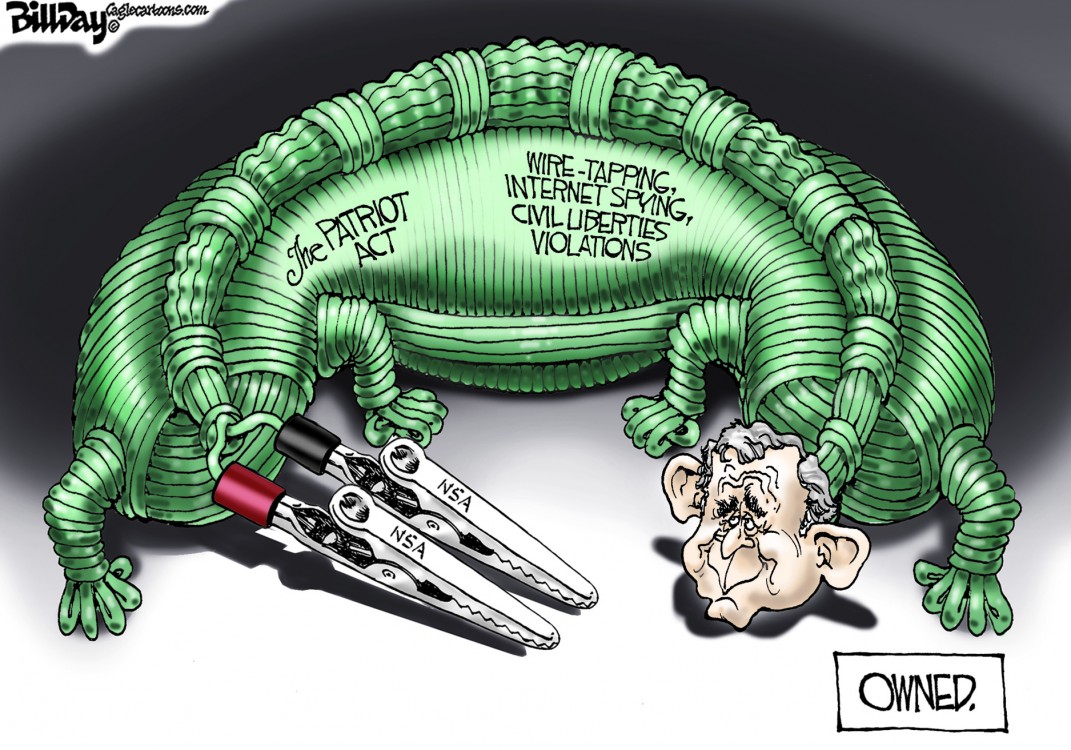
The Senate on Tuesday passed a bill to end the bulk collection of millions of Americans’ phone records, ushering in the country’s most significant surveillance reform since 1978 two years after NSA whistleblower Edward Snowden’s revelations to the Guardian.
Senators voted 67-32 to pass the USA Freedom Act, which overwhelmingly cleared the House of Representatives. Hours later, Barack Obama signed the legislation, after saying he would “work expeditiously to ensure our national security professionals again have the full set of vital tools they need to continue protecting the country.”
The passage of the USA Freedom Act paves the way for telecom companies to assume responsibility of the controversial phone records collection program, while also bringing to a close a short lapse in the broad NSA and FBI domestic spying authorities. Those powers expired with key provisions of the Patriot Act at 12.01am on Monday amid a showdown between defense hawks and civil liberties advocates.
The American Civil Liberties Union praised the passage of the USA Freedom Act as “a milestone” but pointed out that there were many more “intrusive and overbroad” surveillance powers yet untouched.
“This is the most important surveillance reform bill since 1978, and its passage is an indication that Americans are no longer willing to give the intelligence agencies a blank check. It’s a testament to the significance of the Snowden disclosures and also to the hard work of many principled legislators on both sides of the aisle,” Jameel Jaffer, the group’s deputy legal director, said in a statement.
But the passage of the Freedom Act will mean the re-starting of the very program Congress voted to kill.
The NSA, facing legal uncertainty after the Senate failed to pass the bill last month, shut down the bulk collection of phone records at 8pm on May 31. But since the bill calls for a grace period of six months to “transition” the program so the phone companies remain the repositories of metadata they generate, the dragnet is now set to relaunch just to be shut down again in December.
A senior administration official told the Guardian the NSA was facing “a restarting process."
Oregon senator Ron Wyden, a Democrat on the intelligence committee who has railed against NSA surveillance for years, praised the breakthrough but said the work is far from complete.
“This is the only beginning. There is a lot more to do,” Wyden told reporters after the vote. “We’re going to have very vigorous debate about the flawed idea of the FBI director to require companies to build weaknesses into their products. We’re going to try to close the backdoor search loophole – this is part of the FISA Act and is going to be increasingly important, because Americans are going to have their emails swept up increasingly as global communications systems begin to merge.”
He also pointed to a proposal in the House “to make sure government agencies don’t turn cell phones of Americans into tracking devices” as another target for NSA reformers.
In a particular blow to Mitch McConnell, the Republican majority leader, and Richard Burr, the intelligence committee chairman, the Senate rejected a series of amendments that were designed to weaken the surveillance and transparency reforms contained in the USA Freedom Act.
McConnell and Burr had led the effort in recent weeks to reauthorize the Patriot Act in its current form, ignoring the will of their colleagues in the House and a majority of the American public.
Adam Jentleson, a spokesman for the Democratic leader, Harry Reid, criticized McConnell’s “toxic mix of poor planning, misguided bravado and stunning lack of communication with his fellow Republicans.”
“The most remarkable thing about the events of the past week is that they were utterly and completely avoidable, but Senator McConnell failed to heed the many warning signs that flashed bigger and brighter than the marquees on the Vegas strip,” Jentleson said in an email.
Despite support for the USA Freedom Act from the House, the Obama administration and the intelligence community, McConnell continued to fight changes to the Patriot Act and went from pushing a full renewal through 2020, to a short-term extension to avoid a lapse, to finally trying to water down the House bill. By the end of it all, the majority leader was left with no other option but to let the USA Freedom Act pass unamended.
McConnell, who is typically known for his calm and collected demeanor, defended his position in a forceful speech on the Senate floor.
The USA Freedom Act is “a resounding victory for those who currently plotted against our homeland”, he said. “It does not enhance the privacy protections of American citizens, and it surely undermines American security by taking one more tool from our war fighters, in my view, at exactly the wrong time.”
Last year, an independent analysis of hundreds of terrorism cases in the US concluded that the NSA’s collection of phone records has had no distinguishable impact on preventing acts of terrorism.
But McConnell accused the Obama administration’s record on foreign policy of undermining national security to make a last stand against reining in the government’s surveillance methods. In a rebuttal, Reid said McConnell was trying to “divert attention” from his own refusal to take up the NSA debate earlier while also dismissing the work of his Republican counterparts in the House.
“He is in effect criticizing the House of Representatives for passing this FISA bill, to reauthorize it in a way that’s more meaningful to the American people and makes us more safe,” Reid said. “Is he criticizing the speaker for working hard to get this bill reauthorized in a fashion that the American people accept? I don’t think any of us … need a lecture on why we are less secure today than we were a few days ago.”
Among the amendments that failed were a measure that would weaken the USA Freedom Act’s establishment of a de facto privacy advocate to, in certain cases, argue against the government on behalf of privacy rights; an effort to allow the phone collection program to continue for a year instead of just six months, as proposed by the House bill; and another provision requiring the U.S. intelligence chief to certify the implementation of the new phone-records regime.
During the surveillance battle, McConnell miscalculated the lengths to which his colleague from Kentucky, Republican presidential candidate Rand Paul, would go to block any renewal of the Patriot Act without reforms. Paul has made his longtime opposition to the NSA’s surveillance dragnet a key tenet of his 2016 campaign and followed through on his pledge to let the Patriot Act expire – although he voted against the USA Freedom Act on Tuesday, arguing that it does not go far enough.
Vermont senator Bernie Sanders, an independent who is challenging Hillary Clinton for the Democratic Party’s nomination in 2016, also voted against the bill for similar reasons.
“We must keep our country safe and protect ourselves from terrorists, but we can do that without undermining the constitutional and privacy rights which make us a free nation,” Sanders said in a statement. “This bill is an improvement over the USA Patriot Act but there are still too many opportunities for the government to collect information on innocent people.”
Other presidential candidates in the Senate were in different camps: Texas senator Ted Cruz supported the USA Freedom Act, of which he was a co-sponsor, while the Florida senator Marco Rubio opposed the bill, arguing instead for a full Patriot Act renewal.
New Mexico senator Martin Heinrich, another Democrat on the intelligence committee, praised the bill’s passage on Tuesday, saying: “Ben Franklin would have been proud of this outcome.”
The US government’s bulk collection program was first revealed two years ago by the Guardian, based on documents obtained from the former NSA contractor Edward Snowden. A federal appeals court ruled the program illegal last month, all but ensuring its days were numbered.
Snowden hailed the movements in Congress and the courts as “without precedent” in an interview with the Guardian last month.
“The idea that they can lock us out and there will be no change is no longer tenable,” Snowden said. “Everyone accepts these programs were not effective, did not keep us safe and, even if they did, represent an unacceptable degradation of our rights.”
Only recently have many lawmakers begun to give Snowden credit for kickstarting the debate. “It is clear we wouldn’t be here without that information,” Republican senator Jeff Flake told the Huffington Post.
For privacy advocates in Congress, the USA Freedom Act is just the beginning.
Libertarian-minded Republicans in the House, who are allies of Paul’s, said on Tuesday they will attempt to use a must-pass defense appropriations bill as a vehicle to advance more surveillance reforms. Their efforts will include blocking the NSA from undermining encryption and barring other law enforcement agencies from collecting data in bulk.
3 WAYS TO SHOW YOUR SUPPORT
- Log in to post comments















